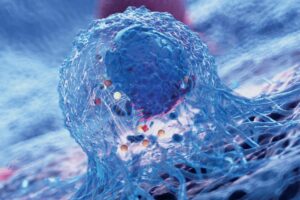Cardiometabolic diseases are a major cause of morbidity and mortality worldwide. A recently published report by the World Health Organisation estimates that 31% of all global deaths are related to these diseases.
One of these disorders in particular has seen a rapid increase globally: non-alcoholic hepatic steatosis (NAFLD).
It is the most common liver disease affecting about a quarter of the world’s population. More precisely, the global prevalence of NAFLD is 25.24% and the rapid increase in cases makes it a significant health and economic burden due to the numerous complications associated with it.
Early identification of this condition and cardiometabolic diseases in general, even before symptoms develop, is crucial to protecting health. Indeed, these diseases can be prevented or delayed and their management often starts with lifestyle changes, including weight loss, exercise, a healthy diet and quitting smoking. In this scenario, an effective preventive strategy also includes the daily intake of dietary supplements.
Biofarma Group, a leading global CDMO group in the production of nutraceuticals targeting different therapeutic areas, has consolidated its expertise in the formulation of dietary supplements aimed at cardiometabolic well-being.
Recently, the Group approached an innovative method for combating this disease. This approach is designed to overcome the challenges and limitations encountered in ‘traditional’ nutraceuticals, mainly linked to the multifactorial nature of cardiometabolic diseases, which are in fact characterised not only by a genetic component, but also by a significant environmental influence, a factor that makes their early diagnosis, prevention and treatment notoriously complex.
We are talking about nutrigenomics, an interdisciplinary approach that combines nutrition and genetics, allowing more accurate and targeted therapeutic and preventive personalisation. Specifically, nutrigenomics focuses on the effect of nutrients on the genome, proteome and metabolome and explains the relationship between these specific nutrients and diets on human health. The development of knowledge in this area is promoting a greater understanding of how nutrition influences metabolic pathways, helping to prevent the development of chronic diseases, such as NAFLD.
Similar to food and the support of a balanced diet, the active ingredients of food supplements also have the power to influence gene expression involved in metabolism, thus reducing the risk of developing related diseases.
Nutrigenomics applied to nutraceutics therefore aims to overcome the limitations of more traditional approaches by adopting a method that considers not only the genetic aspects of diseases, but also the dynamic interaction between genes and the environment. This new paradigm makes it possible to develop innovative food supplements and customised solutions, guided by science and aimed at maximising efficacy in improving cardiometabolic well-being.
A nutraceutical for NAFLD based on nutrigenomics
Biofarma Group’s Innovation team, through the collaboration with a Key Opinion Leader expert in cardiometabolic diseases, has therefore initiated a new scientific research process for the development of a nutraceutical product aimed at combating NAFLD.
The aim is to fully explore the scientific, biological and pathological background of the condition, using advanced nutrigenomic approaches, in order to identify genetic markers involved in the disease. These are genes associated with lipid and glucose metabolism, including synthesis and oxidation of short-chain fatty acids (SCFA), insulin resistance (IR) and macrophage M1 and M2 polarisation.
On the basis of the genetic markers identified, a set of active ingredients capable of positively modulating their expression was selected: vitamins, minerals and other substances with specific claims, associated with probiotics selected for their beneficial activity capable of inducing an improvement in the main metabolic parameters.
The active ingredients were selected on the basis of scientific evidence showing their beneficial effects on metabolic syndrome and insulin resistance, as well as their ability to contribute to normal macronutrient metabolism and maintenance of normal blood glucose levels. They also play an important role in detoxification processes of the body and liver, whose filtering functions they support. They help neutralise endogenous toxins, produced by the body itself, and exogenous toxins. Finally, their lipotropic function, aimed at mobilising fats from the liver, is essential for the health of this organ, as fat and bile deposits are often associated with the development of more serious disorders such as NAFLD.
Probiotics have been included among the nutraceutical compounds because a growing body of scientific evidence has revealed the association of dysbiosis of the gut microbiota with not only intestinal disorders, but also other disorders such as NAFLD.
Dysbiosis is defined as any imbalance or change in bacterial content or metabolic functions, or any alteration in bacterial distribution within the gut, that is associated with a disease state.
Studies show that a dysbiosis of the gut microbiota contributes to NAFLD through various mechanisms, including the regulation of energy homeostasis through fermentation of SCFA carbohydrates and an increase in bifidobacteria.
However, numerous researches have shown that a variety of interventions, including diet, can modify the components of the gastrointestinal microbiota, favouring a healthy, multivariate one to restore its physiological state. Indeed, diet increases the production of beneficial metabolites, reduces the population of certain pathogenic bacteria by increasing bifidobacteria; as well as having effects on intestinal permeability.
The role of the probiotic selected within the nutraceutical is therefore to restore the physiological state of the microbiota; a function that is also important for the prevention of liver disease and the regulation of metabolism.
The efficacy of the described formulation will be tested through a protocol involving two distinct levels. First, in a pre-clinical phase, a dose-response test will be conducted on tissue-specific cells, followed by gene expression analysis using DNA microarrays before and after incubation with the dietary supplement. This step is crucial for understanding the nutrigenomic implications of the formulation.
Next, a clinical study will be carried out involving 50 subjects with NAFLD and dysmetabolism, in which the food supplement will be administered to the participants, evaluating over time the variation in the expression of genes involved in dysmetabolism. This phase will allow further validation of the results obtained in the pre-clinical phase and will make it possible to create the first scientific evidence capable of assessing the mechanism of action of a food supplement, in order to understand the real effect on the final consumer, before and after its intake.
In conclusion, the study will make it possible to assess how the supplement formulated by Biofarma Group is able to influence gene expression in patients suffering from NAFLD with at least one dysmetabolic datum (e.g. BMI, waistline or prediabetes) and thus to determine how the supplement is then able to restore the normal expression of these genes, restoring a healthy condition.
Content sponsored by Biofarma Group
Bibliography
A., P. (2007). From nutrigenomics to personalised nutrition. . Genes Nutr. , 2(1):5-7.
Agrawal P, K. J. (2023). Genetics, Nutrition, and Health: A New Frontier in Disease Prevention. . J Am Nutr Assoc., 28:1-13.
Attaye I, P.-S. S. (2020). Crucial Role for Diet in the Relationship Between Gut Microbiota and Cardiometabolic Disease. Annu Rev Med. , 71:149-161. .
Del Ben M, P. L. (2014). Modern approach to the clinical management of non-alcoholic fatty liver disease. World J Gastroenterol. , 20(26):8341-50.
Iacono A, R. G. (2011). Probiotics as an emerging therapeutic strategy to treat NAFLD: focus on molecular and biochemical mechanisms. J Nutr Biochem. , 22(8):699-711.













